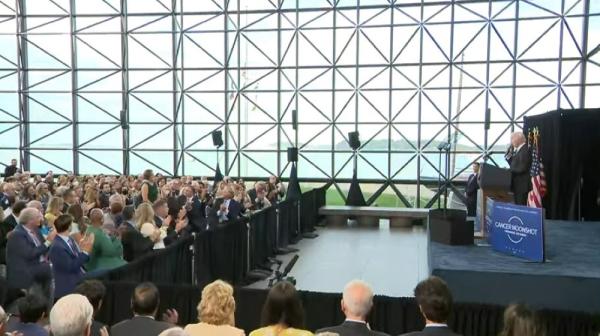September 12, 2022

President Biden spoke about his administration's "Cancer Moonshot" initiative in the atrium of the John F. Kennedy Presidential Library in Dorchester on Monday, Sept. 12, 2022. Image courtesy State House News Service
With Dorchester Bay behind him, President Biden on Monday outlined plans to “end cancer as we know it,” pitching the possibility of a vaccine instead of “grueling chemo” treatments.
The city and state’s political class sat in front of him at the JFK Presidential Library and Museum, which Biden called a “powerful place for reflection and remembrance.” The White House picked the library as the setting for his “Cancer Moonshot” speech, keying off on the sixtieth anniversary of President Kennedy’s call to action, delivered at Rice University in Texas, for the US to go toe to toe with the Soviet Union in the race to dominate space and reach Earth’s natural satellite.
Biden name-checked US Sen. Ted Kennedy, who died from cancer in 2009, and his son Beau Biden, who died in 2015 at the age of 46. Biden also noted that his labor secretary, Dorchester’s Marty Walsh, is a survivor of childhood cancer.
The US faces an “inflection point” similar to Kennedy’s call for unification in 1962, Biden said, pointing to cancer’s lack of discrimination against one’s politics.”It doesn’t care if you’re a Republican or a Democrat. Beating cancer is something we can do together. And that’s why I’m here today.”
Since President Richard Nixon signed the National Cancer Act in 1972, scientists have discovered cancer isn’t a single disease, but 200 different types caused by genetic mutations. New Medicine, therapies and early detection measures followed, according to Biden. In the last 25 years, the death rate has fallen more than 25 percent, but it remains the second largest cause of death in America, behind heart disease.
Over the next 25 years, Biden hopes the “Cancer Moonshot” initiative cuts the rate in half and turns cancer into a chronic disease that can be managed instead of a death sentence.
Scientists are exploring whether the same technology that offered up COVID vaccines could be used to stop cancer cells, he continued.
But Biden added the battle against childhood cancers lacks a strategy, and there isn’t enough data-sharing happening. “We know we can change the trajectory,” he said.
He plans to use his presidential authority to “supercharge” the “Cancer Moonshot” initiative, he said, breaking logjams and speeding breakthroughs with the help of his “cancer cabinet,” launched seven months ago.
"Imagine molecular ZIP codes that could deliver drugs and gene therapy precisely to the right tissues,” Biden said. “Imagine simple blood tests during an annual physical that could detect cancer early when the chances of a cure are best. Imagine getting a simple shot instead of grueling chemo or getting a pill from a local pharmacy instead of invasive treatments and long hospital stays.”
Biden also used the occasion of his visit to Dorchester to announce the appointment of Dr. Renee Wegrzyn as the first director of a new federal entity called Advanced Research Project Agency for Health (ARPA-HA), focused on biomedical innovation. Wegrzyn, the vice president of business development at South Boston-based biotech Ginkgo Bioworks, joined Biden at JFK Library for the announcement.
The agency has received $1 billion in federal funding to get up and running. "ARPA-H will have the singular purpose to drive breakthroughs to prevent, detect and treat diseases including cancer, Alzheimer's, diabetes, and other diseases, and enable us to live healthier lives," Biden said.
A competition is underway to host the new agency and receive the acclaim and federal funding that will come with it. Massachusetts is one of several states aiming to become its headquarters.
The Bay State is in a strong position to get it, due to its extensive biomedical institutions and higher education sector.
According to the Mass. Biotech Council, an industry trade group, 106,704 biotech people are employed here, with wages reaching an annual $201,549. By the end of 2025, the industry could see the addition of 26 million and 59 million square feet of Massachusetts real estate.
A good chunk of that real estate could end up in Dorchester. The sprawling project known as “Dorchester Bay City” seeks to add life science, commercial and residential space atop the site of the former Bayside Exposition Center on the Columbia Point peninsula, just down the street from the presidential library where Biden gave his speech.
Material from State House News Service was used in this report.



